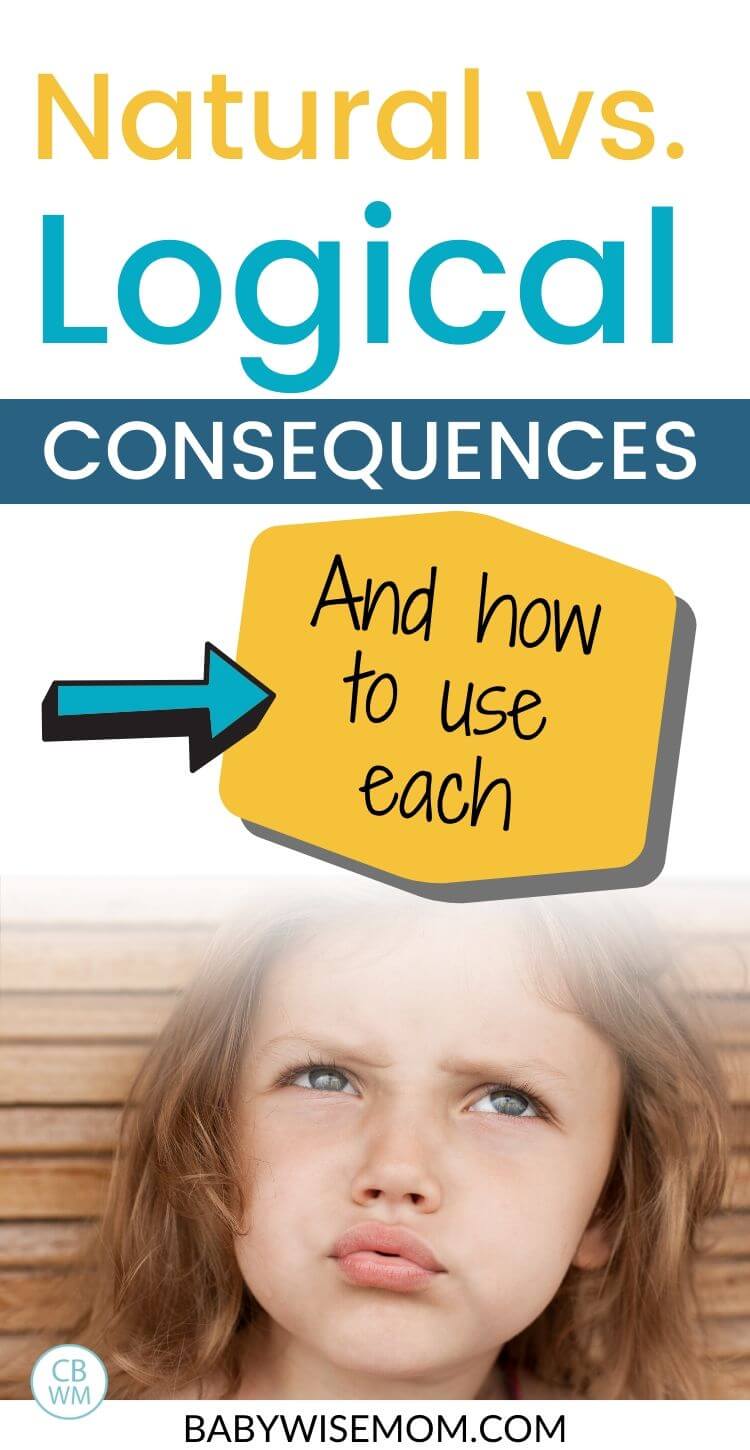Learn all about what a natural consequence is and what a logical consequence is and tips for using each type. Learn also when to intervene.

I think the most powerful discipline tool you have as a parent is consequences.
If X, then Y.
It sounds simple enough, right?
Well, we all know raising children isn’t ever that simple, so let’s try to elaborate.
There are two types of consequences: Natural and Logical.
Post Contents
Natural Consequences
Natural consequences are something that happens naturally when you do something.
Maybe your child is bugging the cat over and over even after being told not to and the cat scratches him.
The pain from the scratch is the natural consequence. It is a natural course of action that happened because the child continued to pester the cat.
Another example of a natural consequence is getting cold because you didn’t put a coat on. If you instructed your child to get a coat before heading out the door and he doesn’t, then him getting cold later is a natural consequence he can learn from.
Natural consequences are pretty easy because you don’t have to do anything as the parent. They naturally happen.

Logical Consequences
Logical consequences are consequences you either create or simply allow to happen as the parent.
I use logical consequences more than any other tool in disciplining. They work well for my brain; I am very logical.
Logical consequences are the types of consequences most often discussed in Parenting With Love and Logic.
Read: Parenting With Love and Logic: Everything You Need to Know
Here are some examples of logical consequences.
Don’t pick up your toys? You might lose that toy for a time.
Can’t get along with your sibling? Then you don’t get to play with your sibling.
Didn’t eat your dinner? Don’t expect an early breakfast.
Did you turn on the TV without asking? I guess you lost TV for a few days.
Did you mis-use a toy and hit your brother with it? Then you don’t get to play with it.
Did you color on the table on purpose? No more coloring today.
I think logical consequences can sound harsh. The parent sounds compassion-less and strictly judgmental.
Using logical consequences means you are allowing your child to learn from decisions and actions taken. But we don’t have to be robots. We can allow there to be grace along with allowing consequences.
Read: 10 Guidelines for Using Logical Consequences
I honestly see people in chat groups that say they don’t let their child experience consequences as they come. They shield them. They protect them. They are only children after all!
Fuzzy Line of Consequences
Here is the fuzzy line of consequences.
There are consequences that happen pretty automatically and can be considered natural, except they are controlled by people.
Let’s say your child was late for school because he wouldn’t get out of bed. The school docks his grade unless it is an excused tardy.
You, the parent, have the power to offer the excuse.
This is a situation when consequences get difficult.
You want your child to have good grades. Think of the importance of the grades in his life! But you also don’t want to bail him out for being a slacker.
This is a situation I believe you have him accept the consequences for his actions. I am sure some will disagree, but I think most experts agree with me on this.
I would have him take the grade hit. He didn’t get out of bed and he needs to face all of the consequences that brings with it. He will need to work to make up for that grade hit.
And he probably will make sure he gets out of bed next time.
Read: Should You Bail Your Child Out?
It is harder than you might think to allow your child to face consequences. It is not easy to watch our children struggle at all.
Our world is gaining more and more people unwilling to accept the consequences of their actions. Nothing is ever their fault.
Even something like running out of money in the checking account isn’t their fault. It must be someone else’s. The bank didn’t tell them. So-and-so took a long time to cash a check so they thought they had more money than they did.
We are constantly looking for bail outs.
Most people who refuse to accept responsibility for actions were raised by parents who felt bad for the child and removed these natural consequences in life.
It was done out of love, but in the long-run, it didn’t do the child any favors. At some point, we all face someone who expects us to answer for our actions.

Teach While Stakes are Low
I like the thought from the book Parenting With Love and Logic. The book says you need to teach consequences while the stakes are low.
Say your 2 year old is absolutely devastated that she can’t color any more today since she intentionally colored on the table instead of the paper (real life example from my own life with a two year old).
She had the perfect little sad face and the tears fell just right. Her big eyes were brimming. Her lip pouted just so. She hugged me in despair.
It is easy to think, “oh, she is repentant. I am going to forgive her and give back these crayons.”
How likely do you think she is going to be to color on that table again? Very. I would bet she colors on the table again that same night.
Let’s say instead you think, “Oh good. She is experiencing the pain of a consequence. From my perspective, losing crayons for one day is not a big deal in her life. I am going to let her ride this out.”
You hug her. You tell her you know she is sad. And you explain that she made a choice and she doesn’t get to color for the rest of the day because of her actions.
Perhaps by starting on this path now, you are better equipped to avoid her losing her license for traffic violations. Or maybe she will be sure to work hard in school and stay on top of her grades.
She will not always be able to turn on the charm and cry her way out of situations in life. At some point, someone somewhere is going to call her out and force her to face the choice she made.
If it isn’t you, it will be friends, school, bosses, law enforcement, the bank…someone will do it. It is an easier lesson to learn on crayons than on a mortgage.
But let’s take this up a level. I think most of you are desirous of more for your children than avoiding getting into financial or legal trouble.
As Walter Williams once put it,
“Laws Are a Poor Substitute for Common Decency, Moral Values.”
Walter Williams
Just because something is “legal” doesn’t make it right morally.
We want to teach our children to understand that actions have consequences while they are young so they can learn to apply this understanding in their lives morally.
With this ability, they can be internally driven to do what is right rather than simply trying to stay within the bounds of the law.
Logical consequences are hard. They take consistency and resolve. They require that you listen to more crying and whining than you would otherwise.
It is always easier in the moment to give your child just one more chance.
Keep the end goal in mind.
You are the parent. It is your job to teach the effects of choices and consequences.
Yours.
The world will hand the consequences out. It is your job to prepare your child while the stakes are low.
And in the end, you want your child choosing the right even if there are no obvious consequences attached to doing something wrong.
Another example of low stakes found in Love and Logic is the idea of getting hurt. The authors basically say that you should allow your young toddler to get hurt while the stakes are low.
Now, this doesn’t mean you hand her a knife or put her up at the top of the stairs and say “jump!” You still need to make her environment safe.
But it means you don’t hover. You allow her to trip and fall. You allow her to go walk on the rocks and discover they are pokey.
My caveat with this idea is I think you first need to educate the child, and you also need to allow things age appropriately.
You tell your child the rocks are pokey and it will hurt her feet to walk on them–and this is assuming she is old enough to understand what you are telling her.
You don’t put your toddling 12 month old down on the ground just let her go for the rocks. So protect as age appropriate and teach before allowing consequences to take place.
And then let your child learn.
Sometime, your child is going to take a physical risk. It will be best if he did it while the stakes were low.
He can understand what pain feels like and that he isn’t superman after all in a low-stakes situation.
If he goes through his toddler years being protected from every fall, then as his physical abilities improve, and therefore his ability to take higher risks improve, he has a greater chance of getting hurt, and hurt seriously.
You can’t hover forever. Someday, he will be somewhere without you.
I remember this thought being powerful to me with Brayden. I was the hovering mom trying to make sure he never felt pain.
I caught him before he hit the floor–every single time. I finally let go and allowed him to do age-appropriate things where he might get hurt.
With Kaitlyn, I was awesome at stepping back and letting her have that freedom she needed from the beginning.
There was a stark contrast between how Brayden handled pain and Kaitlyn.
Remember Context
While applying logical consequences, remember context.
When your child is sick, teething, tired, or hungry, have extra patience for your child.
You also want to be sure your child knew there would be a consequence. You have to be careful here. If you told your child, you need to follow through. Don’t think, “Oh, he probably didn’t hear me”. It is important to follow through.
This is why requiring a “Yes, Mommy” and utilizing Ask and Tell are so helpful. You both know you both understood.
Logical consequences are a just action. As the parent, you need to be sure you apply mercy here, also.
Use your best judgment to know how much to ignore during these tired and sore times for your child.
Conclusion
Don’t underestimate the power of consequences. I really think if you can apply and allow consequences appropriately, you don’t have to do much else in the form of correction.
While I don’t love everything in Love and Logic, I think it is great for getting you in the mindset of applying logical consequences. There is also some discussion of consequences in On Becoming Preschool Wise.
RELATED POSTS

This post originally appeared on this blog in February 2010
